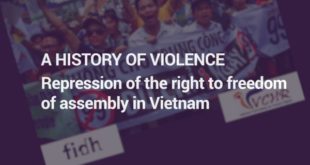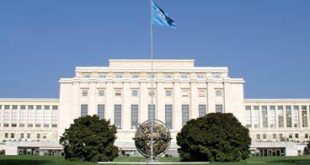The International Buddhist Information Bureau (IBIB) has received a letter co-signed by 107 young Buddhist monks in Hue. Dated 30th November 2003, it strongly condemns a recent letter from Thich Tri Tinh, President of the Executive Council of the State-sponsored Vietnam Buddhist Church (VBC) to the Speaker of the U.S. House of Representatives rejecting Resolution 427 on Religious Freedom in Vietnam, adopted on November 19th. On 24.11.2003, Thich Tri Tinh wrote : “Resolution 427 proposed by some members of the House of Representatives is illegitimate”… He requested “the Speaker of the U.S. House of Representatives to act in his capacity to prevent these and similar activities of some of the House members who misinterpret the situation of Vietnamese religious practices to intervene in the religious affairs of Vietnam in general and the Vietnamese Buddhist Sangha in particular”.
The 107 young Buddhist monks, who are currently studying in 14 prestigious Pagodas in Hue such as Linh Mu, Quoc An, Tu Hieu etc… said they were “filled with infinite sadness and shame” after reading Thich Tri Tinh’s letter to the US Congress. Especially, they stressed, as Thich Tri Tinh was once a leading figure in the Unified Buddhist Church of Vietnam (UBCV), head of the UBCV Commission on Sangha Affairs. Today, Thich Tri Tinh was “turning his back on his fellow Buddhists and seeking to crush them”.
They noted that many monks in the State-sponsored VBC agreed with their letter, but “could not sign for fear of being expelled from their pagodas, deprived of their residence permits, refused temporary residence or expelled from the orders – things which have happened time and time again” in Vietnam.
The letter from Hue is particularly striking because its signatories all belong to the post-Vietnam war generation, yet they have a keen knowledge and appreciation of the origins, historic role and spiritual value of the banned Unified Buddhist Church of Vietnam (UBCV) : “Almost all of us we were born after 1975. Yet we have read about the UBCV through books and documents, and we have seen with our own eyes the UBCV’s actions and engagement”. The UBCV is “the worthy heir to a 2,000-year tradition of Vietnamese Buddhism”, they wrote, a Church “led by talented and virtuous monks”, which “has made remarkable contributions to the development of Buddhism and our people”.
The 107 young monks said their esteem for the UBCV had increased since the “events at Nguyen Thieu Pagoda, Binh Dinh Province and the “Luong Son Affair”” (i.e. the recent crackdown on the UBCV, beginning with the 10-hour standoff with Police on October 8th after the UBCV Assembly in Binh Dinh, and the arrests of 11 UBCV leaders near Nha Trang on the following day). “The State has systematically sought all means possible to repress the UBCV, using both subtlety and ruthlessness in the aim of destroying it irrevocably. Yet the UBCV continues to survive, undaunted. On the contrary, the UBCV has striven to emerge, it has astonished the world, and gained the sympathy and respect of one and all. The UBCV is admired and adhered to by millions of monks, nuns and Buddhists inside and outside Vietnam. Moreover, it is widely supported by the international community, as the two Resolutions passed in the US Congress and the European Parliament amply prove ”…
Challenging Thich Tri Tinh’s affirmation that the VBC was the “sole representative of Vietnamese Buddhism” and that “only a very few Buddhists were dissatisfied with the organization and activities of the VBC”, the 107 monks exclaimed : “You know very well that is not true. You know who set up [the VBC], and who controls it. Indeed, you are not the only one – everyone else knows it too – the VBC was set up by the State, and it is regulated and controlled by the State… There is not one Buddhist in Vietnam today who is not dissatisfied with the organization and activities of the VBC. Let’s have the courage to say it loud and clear. Not only are we dissatisfied, but we cannot stand it any longer. Everyone can see that VBC is not a religious organization in the traditional sense. It is just a tool of the Communist Party of Vietnam”.
As for Thich Tri Tinh’s claims that Resolution 427 was “illegitimate”, the young monks urged the VBC dignitary not to “talk about things you don’t understand. It is up to Members of the U.S. House of Representatives to judge whether the Resolution is illegitimate or not. They know much more about it than you do. It’s their job. It’s really unbelievable that you are giving lessons on American law to Members of the U.S. Congress. You reject the Resolution as an interference into the internal affairs of Vietnam, yet you yourself have interfered into the internal affairs of the U.S. Congress and the American people by writing to the Speaker of the House of Representatives to educate him on American law”.
In conclusion, the 107 monks from Hue told Thich Tri Tinh : “Unfortunately for you, your letter has had the opposite effect” because it merely “underscores the VBC’s role as an obedient member of the Vietnam Fatherland Front”. All State-sponsored religious bodies are members of the Vietnam Fatherland Front, a representational “mass” umbrella organization under Communist Party control. The 107 monks quoted Article 9 of the Vietnamese Constitution which states : “The Vietnam Fatherland Front and its member organizations constitute the political base of the people’s power”.
 Quê Me Quê Me: Action for democracy in Vietnam & Vietnam Committee on Human Rights
Quê Me Quê Me: Action for democracy in Vietnam & Vietnam Committee on Human Rights


